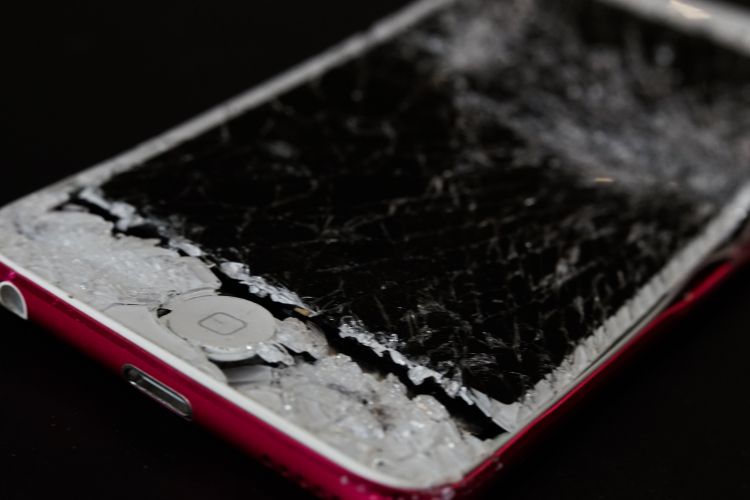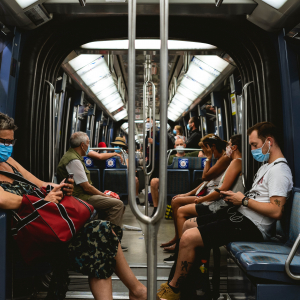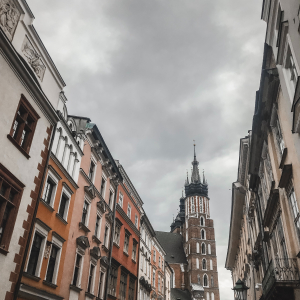My Month Without A Phone

It happened suddenly and without notice — the torrential downpour that would ruin my phone and alter my perception. I was sure I was well equipped to head to Florence Kahn, a charming Jewish bakery in Le Marais, when I departed my Paris apartment on that fateful day. My Doc Martens were laced up and my olive-green puffer jacket was on, both articles of clothing I was sure would not falter in the face of the capricious Parisian weather.
As I descended five flights of stairs (sans elevator, the struggle is real) I knew that I would be out of my house for 15 minutes tops and wrongfully assumed I had nothing to worry about. I arrived at the bakery and purchased my apple strudel (one of the best in Paris) and Challah, when all of a sudden it began. The slight drizzle quickly evolved into a monsoon and there I was, struggling to tuck my precious goods under my arms in my jacket whilst walking so quickly I was sure I could be the newest addition to the speed walking Olympic team.
I kept my head down, cursing myself for not bringing an umbrella, though I’m sure it wouldn’t have made much of a difference, and sharing sympathetic glances with the herds of fellow Parisians huddled under awnings waiting for an end to our collective suffering. I had made it to the base of my ancient, winding staircase where I let out a sigh of relief — I had made it, and it was time to assess the damage. I reached into my pockets when horror befell me, then panic. Nearly 3cm of water had collected in my pockets, creating a pool where my phone, keys, and my AirPod were left wading.
“NO NO NO PLEASE WORK!” I begged my devices, as if they were sentient beings who would understand my desperate pleas and somehow autocorrect the damage.
I felt like an ER doctor in my living room, desperately dumping rice into a bowl, surgically removing my SIM card, and trying to revive my sopping wet phone that contained my entire life. 24 hours later, my phone had flatlined and I knew it was over.
I wouldn’t categorize myself as someone who had a ‘phone addiction’ per se, but when you go without a phone for a month you realize that, to a degree, we all have a toxic relationship with this small device that is always within reach. From the moment we wake up to the moment we rest our head and all the seconds in between, we are slaves to a 6.1-inch screen that is in control of our memories, contacts, affects, and validations. We all know this but going without a phone opens one’s eyes to hold it has on others — there is something almost hypnotic about it. Staring into a glass screen constantly, as if we are staring into a crystal ball trying to make sense of our lives and futures, entranced by what we might see and extrapolate from it.
WEEK ONE
It is not an exaggeration to say that smartphones have become an extension of ourselves. I noticed that I had something akin to ‘Phantom Limb Syndrome’ — I would feel the presence of my phone in every mundane activity I took part in. Waking up, brushing my teeth, making coffee, sitting on my couch — I would instinctively reach for it to ‘check’ something, as if I couldn’t fathom the idea of completing a task without glancing at an illuminated screen.
The sounds of the city were something that was initially quasi-foreign thanks to noise canceling AirPods. It was like I had awakened after being comatose, I listened to the sounds of the street sweepers, the conversations, the sounds of the metro, and for the first time in what felt like an eternity, I was entertained by my thoughts and whatever I perceived or heard around me in real time. There was an uninterrupted internal dialogue that took the place of my compulsive need to ‘keep myself busy’ by incessantly being on some app or listening to my Spotify playlists. Whether that was Snapchat, Twitter (my kryptonite), Instagram or Raya — I soon relished in the feeling of being ‘off the grid’.
It’s quite bizarre when you are the only one without a phone, I felt like Caliban in Shakespeare’s The Tempest when he saw his reflection in the mirror. Everywhere I looked I saw the horrors of a dystopian society being reflected back at me — people everywhere with their necks craned downwards staring and perpetually scrolling. You notice how much people ‘phub’ in their day to day lives, leaving you sitting there staring at them in bewilderment. Phubbing is a new noun that was coined in our digital age — it is the practice of ignoring one’s companion(s) in order to pay attention to one’s phone, and my god it was rampant.
The only downside of the week was not having the Google Maps application. I was on Line 1 of the Métro when the train zoomed past Concorde, the one station I needed to stop at in order to change lines and make it to class. Left without any means to quickly find an alternate route, sorely lacking the knowledge on Métro connections, and no way to contact my brother to let him know I would not be meeting him, I was forced to go to Bastille and wait patiently to make it to university. An agonizing 15 stops, where I felt my blood boiling from frustration until I resigned and accepted my predicament.
WEEK TWO
Now to be quite honest I did not expect to be without a phone for this long. My order from Apple was set to be delivered in another week and here I was, ready to embark on a trip to Krakow — absolutely phoneless. I had my mother call the Uber from the states and was ready to go. I arrived at CDG airport and was greeted by a man checking passenger boarding passes before they were allowed to enter the terminal.
“Bonjour Monsieur, pardon mais je n'ai pas un portable. J’ai besoin de faire imprimer mon billet.”
He retorted: “C’est 2021. Vous n’avez pas un portable?”
Ah yes, the response I would become all too familiar with in the coming weeks. When you go without a phone, the reaction you get is one of utter perplexity. You get the sense that what people really want to say is “Why would you ever do that to yourself?”
When in Poland, I felt like I was more present and connected with others in a way that I found more meaningful. Rather than googling where to go and what to do, I tagged along with whomever had the means of directing how to get to the next destination and I loved it. I used a physical map for the first time in my life to find my way back to the hotel when I was wandering alone. Getting turned around and lost was a foreign experience, but the anxiety wrapped with giddy spontaneity felt like I was transported back to an age where a little blue dot was not tracking my location and directing my every. I let the ‘vibes take me’, as the kids say.
With a Kodak disposable camera, I found that I had to absorb the scenery and the information because of the finite number of photos I could capture. It was amusing that people assumed I was ‘retro’ for taking photos with it, when in reality that was my only tangible method of documentation. We have gotten to a point where it’s become automatic to snap a photo or post an Instagram story of the scenery, that we almost forget to savor it and fully register the moment in our memory.
I can say with full certainty that I would not have had as great of an experience in Krakow and at Auschwitz if I had a phone. I felt more connected, aware, and experimental. That is something I came to love about the second week — the improvement of my social skills. I would unabashedly strike up conversations with strangers and would join in on conversations I overheard, making for very interesting stories that I will have with me forever and something that a phone has made archaic and insipid in nature.
WEEK THREE
Usually when one takes a ‘social media break’, it is preceded by an announcement of sorts to one’s followers and never lasts for more than a week. The device and our apps have evolved into our social crutches, causing many to hobble painfully when they are removed.
“Your friends are DMing me on Instagram asking about you,” my brother, who had become almost like a gatekeeper of mine, informed me. I both espoused and detested this degree of separation — removing accessibility was refreshing yet isolating. I felt lighter when I wasn’t pressured by new rules of social media and texting etiquette and felt free movement and a reclaiming of my time. The isolation stemmed from the inability to reach out to people on these apps that I had come to detest, for all of their flaws, they do still retain their status as wielding incredible inclusion and social power.
I must admit, I did appreciate not having my phone for midterm season.
WEEK FOUR
When I removed the new iPhone from its extremely well-packaged box, did I felt a bit repulsed at the fragility and cost of the device. The feelings were of a foreign nostalgia when it was resting in my hands. I have had a phone since I was 12, but for the first time in my life I didn't want one because I couldn't unsee how beholden we are to these objects. I felt a lot like the woman in the Black Mirror episode, who had her Grain removed and confidently asserted how she much preferred life in this authentic way.
When you are without a phone, you can more objectively view the realities of their holds on us and how it is imperative to step back periodically in order to gain more perspective about yourself, your surroundings, what we gain from these applications, and how we can find a way to make them work for us in a non-detrimental fashion.
For me, I am still hesitant to log back into my profiles because I fear that accessibility and privacy that I have become accustomed to. Whether we want to admit it or not, the digital age has removed individual agency and authenticity because of these toxic relationships we have with both the device and the applications that thrive within them.
It was an interesting month to say the least, and I can see myself making this phone cleanse and humanly reset (as cliche as that sounds) as sort of ritual. It is extremely important that we all disconnect and evaluate how we can exert a greater sense of control over ourselves and our privacy.









